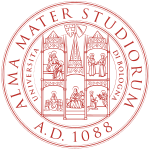University of Bologna
| Università di Bologna | |
 |
|
| Latin: Universitas Bononiensis | |
| Motto | Petrus ubique pater legum Bononia mater (Latin) |
|---|---|
|
Motto in English
|
St. Peter is the father of all places and Bologna the mother of the Law |
| Type | Public |
| Established | c. 1088 |
| Rector | Francesco Ubertini |
|
Academic staff
|
2,850 |
| Students | 82,363 |
| Undergraduates | 52,787 |
| Postgraduates | 29,576 |
| Location | Bologna, Italy |
| Campus | Urban |
| Sports teams | CUSB |
| Colours | Red |
| Affiliations | Coimbra Group, Utrecht Network, UNIMED |
| Website | www |
| University rankings | |
|---|---|
| Global | |
| ARWU | 201-300 |
| Times | 201-250 |
| QS | 208 |
| Europe | |
| Times | =100 |
The University of Bologna (Italian: Università di Bologna, UNIBO), founded in 1088, is the oldest university in continuous operation.
It was the first place of study to use the term universitas for the corporations of students and masters which came to define the institution, located in Bologna, Italy. As of 2013[update], the University's crest carries the motto Alma mater studiorum and the date A.D. 1088. The University has about 85,500 students in its 11 schools. It has campuses in Ravenna, Forlì, Cesena and Rimini and a branch center abroad in Buenos Aires. It also has a school of excellence named Collegio Superiore di Bologna. An associate publisher of the University of Bologna is Bononia University Press S.p.A. (BUP).
The date of its founding is uncertain, but believed by most accounts to have been 1088. The university received a charter from Frederick I Barbarossa in 1158, but in the 19th century, a committee of historians led by Giosuè Carducci traced the founding of the University back to 1088, which would make it the oldest continuously-operating university in the world.
The University arose around mutual aid societies of foreign students called "nations" (as they were grouped by nationality) for protection against city laws which imposed collective punishment on foreigners for the crimes and debts of their countrymen. These students then hired scholars from the city to teach them. In time the various "nations" decided to form a larger association, or universitas—thus, the university. The university grew to have a strong position of collective bargaining with the city, since by then it derived significant revenue through visiting foreign students, who would depart if they were not well treated. The foreign students in Bologna received greater rights, and collective punishment was ended. There was also collective bargaining with the scholars who served as professors at the university. By the initiation or threat of a student strike, the students could enforce their demands as to the content of courses and the pay professors would receive. University professors were hired, fired, and had their pay determined by an elected council of two representatives from every student "nation" which governed the institution, with the most important decisions requiring a majority vote from all the students to ratify. The professors could also be fined if they failed to finish classes on time, or complete course material by the end of the semester. A student committee, the "Denouncers of Professors", kept tabs on them and reported any misbehavior. Professors themselves were not powerless, however, forming a College of Teachers, and securing the rights to set examination fees and degree requirements. Eventually, the city ended this arrangement, paying professors from tax revenues and making it a chartered public university.
...
Wikipedia
